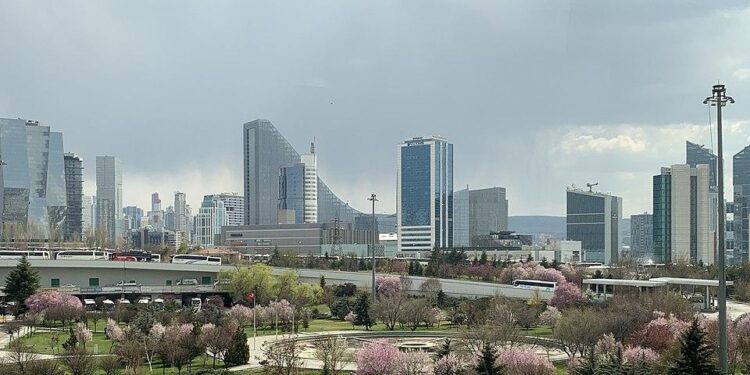Escalating Conflicts in the Eastern Mediterranean: The Controversy Surrounding Turkey’s Offshore Drilling
The dynamics in the Eastern Mediterranean have become increasingly fraught, notably as Turkey amplifies its aggressive stance on offshore drilling activities close to Cyprus. This situation has raised alarms among various stakeholders in the region. The Turkish administration has issued strong warnings against what it perceives as unlawful drilling operations by Cyprus and its allies, firmly defending its maritime rights. This escalation is set against a backdrop of geopolitical rivalry marked by competing claims over lucrative energy resources and longstanding historical grievances. As Ankara’s threats resonate across the Mediterranean, the international community is closely observing potential impacts on security and stability within this already precarious area.
Turkey’s Drilling Claims: A Trigger for Diplomatic Tensions
The ongoing contention over drilling rights near Cyprus is intensifying friction between Ankara and its regional rivals, notably Greece and the Republic of Cyprus. Turkish officials have made emphatic declarations regarding their entitlement to access what they consider valuable energy reserves located in the eastern Mediterranean. This assertive posture not only strains relations with Greece but also prompts European nations to voice their concerns about Turkey’s actions.Analysts note that as Turkey escalates its drilling initiatives, both sides face increasing stakes that elevate the risk of conflict in this already volatile region.
In response to these threats from Turkey, Greece has sought assistance from international allies to bolster Cyprus’s sovereignty. Experts identify several critical factors contributing to this delicate situation:
- Historical Grievances: Long-standing territorial disputes between Greece and Turkey continue to shape geopolitical interactions.
- Competition for Energy Resources: The finding of potentially rich gas fields has intensified rivalry as both nations compete for control over these assets.
- Evolving Alliances: Changes in relationships among countries bordering the Mediterranean are significant as new partnerships form in reaction to Turkish assertiveness.
Assessing Regional Stability: Analyzing Turkey’s Strategic Moves
The recent announcements from Turkey regarding offshore drilling operations near Cyprus carry profound implications for regional stability that require thorough examination. The rhetoric emanating from Ankara suggests a possible shift towards a more confrontational approach directed at both Cyprus and international entities involved in energy exploration efforts. This scenario not only exacerbates existing tensions between Turkey and Greece but also draws larger geopolitical players into an intricate web of interests concerning regional dynamics. Given historical conflicts tied to these territorial disputes, the risk of military confrontation remains ample.
Certain pivotal elements are likely to influence Turkey’s future actions within this increasingly unstable environment:
- Diplomatic Relations: How effectively does Turkey manage relationships with other regional powers amid ongoing rivalries?
- Navigating Energy Interests: The strategic importance of natural gas reserves plays an essential role within Turkish domestic energy policies.
- National Sentiment: Domestic pressures driven by nationalism may push Turkish leadership toward more aggressive posturing.
- The Global Response: Anticipated reactions from NATO allies and EU members regarding any escalatory moves made by Ankara will be crucial moving forward.
The table below summarizes current claims related to energy exploration across the Eastern Mediterranean region:
| Nation | Description Area | Status Update |
|---|---|---|
| Cypress | Description Area 01 (Block 01) | Status Active (Ongoing Exploration) |
| (Greece) | (Ionian Sea) | (Proposed Exploration) |
| (Turkey) | (Eastern Med Region) | (Current Operations Ongoing) |
If Ankara persists with its threats, it could lead Greece to bolster its military presence along with support from allied nations‚ÄĒfurther escalating chances for confrontation.The fragile equilibrium within this critical region heavily relies on diplomatic initiatives alongside multilateral strategies aimed at de-escalation.The outlook remains uncertain; thus vigilance is essential as stakeholders await further developments concerning T√ľrkiye‚Äôs next maneuvers amidst such high-stakes geopolitics!
Strategies for De-escalation: Recommendations for EU Involvement
The European Union must adopt proactive measures aimed at mitigating rising tensions surrounding offshore drilling rights claimed by Ankara off Cypriot shores.Open channels facilitating dialog among all parties involved are paramount.This can be achieved through organizingdiplomatic discussions at high levels;a focus should center upon mutual respect towards sovereignty while addressing maritime entitlements.Additionally,the EU could enhance mediation roles via establishing frameworks promoting peaceful negotiations involving stakeholders like Greece,Cyprus,and T√ľrkiye.Conducting talks under neutral conditions may help mitigate distrust while fostering collaboration opportunities!
An alternative approach includes implementing targeted sanctions or incentives designed specifically encouraging adherence towards international law whilst reinforcing commitments toward maintaining stability across regions!The following measures should be considered:
- Heightened Diplomatic Pressure : Collaborate globally isolating aggressive actions diplomatically .
- Financial Incentives : Provide economic assistance or developmental projects prioritizing peaceful cooperation throughout regions.
- Joint Military Exercises : Conduct collaborative drills alongside member states ; demonstrating unity whilst enhancing deterrent capabilities !
| Strategy | Stakeholders Involved | Expected Results |
|---|---|---|
| Diplomatic Engagements EU,Greece,Cyprus,T√ľrkiye Improved interaction leading towards reduced hostilities ‚ĖĎ‚ĖĎ‚ĖĎ‚ĖĎ‚ĖĎ‚ĖĎ‚ĖĎ‚ĖĎ‚Ėí‚Ėí‚Ėí‚Ėí‚Ėí‚Ėí‚Ėď‚Ėď‚Ėď‚Ėď‚Ėą‚Ėą‚Ėą‚ĖĆ‚ĖĆ‚ĖĆ‚ĖĆ‚Ėą‚Ėą‚Ėą‚Ėą‚Ėą‚Ėą‚Ėą‚Ėą‚Ėą‚Ėą‚Ėą‚ĖÄ‚ĖÄ‚ĖÄ‚ĖÄ‚ĖÄ‚ĖÄ‚ĖĄ‚ĖĄ‚ĖĄ‚ĖĄ‚ĖĄ‚Ėą‚Ėą‚Ėą‚Ėą‚Ėą‚Ėą‚Ėą‚Ėą‚Ėą‚Ėą‚Ėą‚ĖĄ ‚ĖĎ‚ĖĎ ‚ĖĎ ‚ĖĎ ‚Ėą ‚Ėą ‚Ėą ‚Ėą‚Ėą ‚Ėą‚Ėą ‚Ėą‚Ėą ‚Ėą‚Ėą ‚Ėą‚Ėą ‚Ėą‚Ėą ‚Ėą‚Ėą‚Ėą‚Ėą ‚Ėą‚Ėą‚Ėą‚Ėą ‚Ėą‚Ėą‚Ėą‚Ėą ‚Ėą‚Ėą‚Ėą‚Ėą‚Ėą‚Ėą‚Ėą‚Ėą‚Ėą‚Ėą‚Ėą‚Ėą‚Ėą‚ĖĄ ‚Ėí‚Ėí‚Ėí‚Ėí‚Ėď‚Ėď‚Ėď‚Ėď‚ē£‚ē£‚ē£‚ē£‚ēĎ‚ēĎ‚ēĎ‚ēĎ‚ēĚ‚ēĚ‚ēĚ‚ēĚ‚ēó‚ēó‚ēó‚ēó‚ēź‚ēź‚ēź‚ēź‚ēź‚ēź‚ĒÄ‚ĒÄ‚ĒÄ‚Ēľ‚Ēľ‚Ēľ‚Ēľ‚ĒÄ‚ĒÄ‚ĒÄ‚ĒÄ‚ĒÄ‚ĒÄ‚ĒÄ‚ĒÄ‚ĒÄ‚ĒÄ‚ĒÄ‚ĒÄ‚ĒÄ‚ĒÄ‚ĒÄ‚ĒÄ‚ĒÄ‚ĒÄ‚ĒÄ‚ĒÄ‚ĒÄ‚ĒÄ‚ĒÄ‚ĒÄ‚ĒÄ‚ĒÄ‚ĒÄ‚ĒÄ‚ĒÄ‚ĒÄ‚ĒÄ‚ĒÄ‚ĒÄ‚ĒÄ‚ĒÄ‚ĒÄ‚ĒÄ‚ĒÄ‚ĒÄ‚ĒÄ‚ĒÄ‚ĒÄ‚ĒÄ‚ĒÄ‚ĒÄ‚ĒÄ‚ĒÄ‚ĒÄ‚ĒÄ‚ĒÄ‚ĒÄ‚ĒÄ‚ĒÄ‚ĒÄ‚ĒÄ‚ĒÄ‚ĒÄ‚ĒÄ‚ĒÄ‚ĒÄ‚ĒÄ‚ĒÄ‚ĒÄ‚ĒÄ‚ĒÄ‚ĒÄ‚ĒÄ‚ĒÄ‚ĒÄ‚ĒÄ‚ĒÄ‚ĒÄ‚ĒÄ‚ĒÄ‚ĒÄ‚ĒÄ‚ĒÄ‚ĒÄ‚ĒÄ‚ĒÄ‚ĒÄ‚ĒÄ‚ĒÄ‚ĒÄ‚ĒÄ‚ĒÄ‚ĒÄ‚ĒÄ‚ĒÄ‚ĒÄ‚ĒÄ‚ĒÄ‚ĒÄ‚ĒÄ‚ĒÄ‚ĒÄ‚ĒÄ‚ĒÄ‚ĒÄ‚ĒÄ‚ĒÄ‚ĒÄ‚ĒÄ‚ĒÄ‚ĒÄ‚ĒÄ‚ĒÄ‚ĒÄ‚ĒÄ‚ĒÄ‚ĒÄ‚ĒÄ‚ĒÄ‚ĒÄ‚ĒÄ‚ĒÄ‚ĒÄ‚ĒÄ‚ĒÄ‚ĒÄ‚ĒÄ‚ĒÄ‚ĒÄ‚ĒÄ‚ĒÄ‚ĒÄ ‚ĒÄ ‚ĒÄ ‚ĒÄ ‚ĒÄ ‚ĒÄ ‚ĒÄ ‚ĒÄ ‚ĒÄ ‚ēź ‚ēź ‚ēź ‚ēź ‚ēź ‚ēź ‚ēź ‚Ēā ‚Ēā ‚Ēā ‚Ēā ‚Ēā‚Ēā‚Ēā‚Ēā‚Ēā‚Ēā‚Ēā‚Ēā| | | | | | | ### Conclusion: Navigating Uncertain Waters Ahead ### In conclusion, escalating tensions surrounding offshore activities near Cyprus represent a crucial juncture within regional geopolitics.The assertive posture adopted by Ankara regarding drilling rights‚ÄĒcoupled alongside provocative statements‚ÄĒindicates potential conflict escalation not just involving Cypriots but extending also toward Greeks plus other concerned parties.As diplomatic avenues remain strained,the global community‚Äôs reactions will play an instrumental role shaping forthcoming events.Careful observation becomes imperative since miscalculations could yield extensive repercussions impacting overall stability throughout East-Mediterranean waters!As developments unfold,Greece City Times pledges continued updates along insightful analyses pertaining evolving crises! ADVERTISEMENT |
















